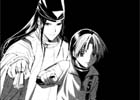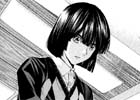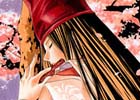Hikaru no Go
| Also Known As: HnG, HnGo, HikaGo | ||
| Genre: Drama | ||
| Length: 23 Volumes | ||
| Allegiance: Shueisha Ltd./Viz Communications | ||
| Mangaka: Hotta Yumi/Obata Takeshi | ||
| Vintage: 1999-2003 | ||
| Intelligence Agency Report by: Djudge | ||
| Fujiwara no Sai was a master go player in the service of the imperial courts of Heian Japan. Through an act of malice and trickery, Sai was falsely accused of cheating while playing a game in front of the Emperor. Afterwards, unable to bear this shame, the illustrious go master committed suicide and existed through the ages as a ghost. Now, in the present day, a young boy named Shindou Hikaru stumbles across a gobanin which Sai was residing. This fateful meeting once again turns the cogs of fate as two destinies become intertwined in the quest for the ultimate move in the game of go: the fabled “kami no itte.” | ||
|
|
||
| Field Agent Report by: Djudge | ||
| Plot Characters Impact Visual |
8.25 8.50 8.50 8.50 |
|
| Overall | 8.50 | |
| (not an average) | ||
| Hikaru no Go is one of the single most popular manga titles to date credited not only with massive merchandise sales and providing the basis for a great anime series, but also, most profoundly, with the resurrection of the global go community. In this title, rookie manga writer Hotta Yumi and mangaka savant Obata Takashi collaborate to transform a game stereotyped to be an activity for the elderly into a heart-pounding battle of sprits in which the reader can not help but conclude once started. The work put into transplanting intense matches into manga format was indeed spectacular and will forever remain the hallmark of this series. However, in between matches, particularly in the manga’s second half, certain flaws in the story design become more and more apparent as the reader closes in on an abrupt ending that will leave fans wanting a just a bit too much more.As you flip through the pages of the manga, you should notice the art starts with more of the familiar, rounder shounen character designs that Weekly Shounen Jump (the magazine which carried HnG during its serial run) fans are used to seeing in their favorite publication. While this works fine in the lighter and more comedic opening segment of HnG, it certainly is a jump away the more photographic-like seinen style that Obata elected to use later on. Either way, the art remains high quality and does not intrude with the atmosphere of the presented plot material. As for the individual character design for each personality in the HnG universe, Obata once again starts strong and ends strong. From some reader’s perspectives, each character’s visual appearance can eventually be considered indicative of the peculiarities that Hotta embedded in the manga’s numerous personalities. This is definitely a rare feat in manga, or even anime for that matter.
As for HnG’s story, a split in terms of overall atmosphere and feel can be marked as the reader progresses into the last third of the manga. In the first dozen or so volumes the reader is introduced to a great cast of characters, each rife with his or her own personality. The chemistry between them, as developed by Hotta, makes for some particularly entertaining sequences. However, over time we see a few characters eventually get shelved as new faces are brought into play. This is an unfortunate turn of events as many of the older supporting cast personalities were developing quite nicely and could have been used again in later story arcs. As awkward as these departures are, they still don’t measure up to the disappointment that was penned in the title’s unwieldy and ultimately graceless finale. The final arc, which is tournament-centric, once again introduces new characters that ultimately flounder due to their “for the moment” purpose. On top of that, the series ends on a note that struggles to emphasize hope and perseverance, but only ends up choking its audience with a mountain of unanswered questions. Frankly, Hotta would have been better off ending the story with the key departure of a key character several volumes before where the emphasis on optimism was still running high. All in all, Hikaru no Go is definitely a success in many levels. Not only does it provide its readers with an exceptionally intense and occasionally humorous experience, but it also manages to open up the world ofgo to a new generation of players. Rarely does manga touch such a wide range of readers as it does here in Hikaru no Go.
|
||




